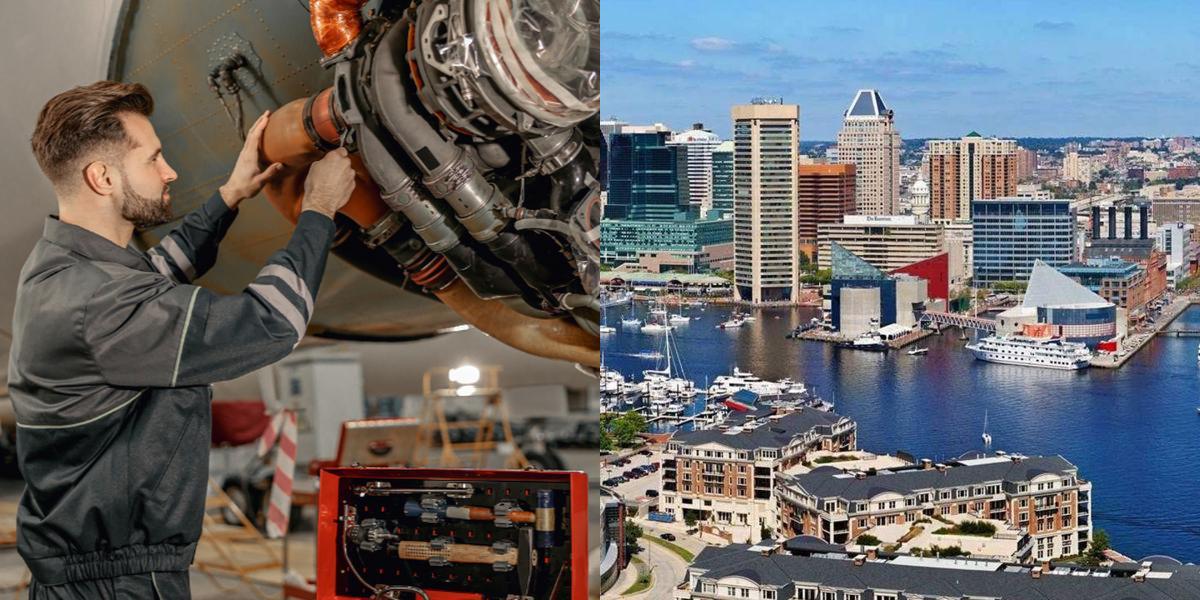How to Become an Aviation Mechanic in Maryland

Aviation mechanics, also known as aircraft mechanics or aviation technicians, are professionals responsible for repairing, inspecting, and maintaining aircraft to ensure they operate safely and efficiently. They play a crucial role in the aviation industry by ensuring that airplanes and helicopters are in optimal condition for flight.
Step 2: Network within the Aviation Industry
Networking is an essential part of finding job opportunities in any industry, including aviation. Attend industry events, join professional organizations, and connect with professionals in the field. Building relationships with industry insiders can help you gain access to job openings and potentially lead to referrals or recommendations.
Consider joining organizations such as the Aircraft Mechanics Fraternal Association (AMFA) or the Professional Aviation Maintenance Association (PAMA). These organizations provide networking opportunities, professional development resources, and job boards specifically for Aviation Mechanics.
Step 3: Explore Job Opportunities
There are various avenues you can explore to find job opportunities as an Aviation Mechanic. Start by searching online job boards, such as AviationJobNet.com or the Federal Aviation Administration (FAA) website. These platforms often have listings specifically for aviation-related positions.
You can also reach out directly to aviation companies, such as airlines, maintenance and repair organizations (MROs), or aircraft manufacturers. Many aviation companies have dedicated career pages on their websites where you can find information about job openings and submit your resume.
Step 4: Prepare for Job Interviews
Once you have submitted your resume and have been invited for an interview, it is essential to prepare thoroughly. Research the company, familiarize yourself with their operations and values, and come up with specific examples that demonstrate how your skills and experience align with their needs.
Be prepared to answer questions about your technical knowledge, problem-solving abilities, and adherence to safety protocols. Additionally, practice answering behavioral interview questions that assess your teamwork, communication, and ability to handle stressful situations.
Step 5: Continue Learning and Developing Your Skills
The aviation industry is constantly evolving, with new technologies and regulations being introduced regularly. To stay competitive in your career as an Aviation Mechanic, it is important to continue learning and developing your skills.
Consider pursuing additional certifications or specialized training in areas such as avionics, composites, or advanced troubleshooting techniques. This will not only enhance your knowledge and expertise but also make you more valuable to potential employers.
Career Paths and Opportunities after Becoming an Aviation Mechanic
Becoming an Aviation Mechanic opens up a wide range of career paths and opportunities within the aviation industry. Here are some of the career options you can explore:
Airline Maintenance Technician
Many Aviation Mechanics find employment with airlines, where they are responsible for maintaining and repairing aircraft to ensure their safe operation. As an airline maintenance technician, you may work on a specific type of aircraft or be responsible for a particular system, such as engines or avionics.
General Aviation Technician
General aviation technicians work for smaller aviation companies or private aircraft owners. They are responsible for maintaining and repairing a wide range of smaller aircraft, including single-engine planes, helicopters, and business jets. This role often involves a broader range of responsibilities and may require more versatility in skills and knowledge.
Aircraft Manufacturing Technician
Aircraft manufacturing technicians work in the production facilities of aircraft manufacturers. They are involved in assembling, testing, and inspecting new aircraft before they are delivered to customers. This role requires a strong attention to detail and a thorough understanding of aircraft systems and manufacturing processes.
Aviation Maintenance Instructor
Experienced Aviation Mechanics can pursue a career as an instructor at an Aviation Maintenance Technician school or a vocational training center. In this role, you would be responsible for teaching students the skills and knowledge required to become Aviation Mechanics. This career path allows you to share your expertise and contribute to the development of the next generation of Aviation Mechanics.
Field Service Technician
Field service technicians work for aircraft manufacturers or maintenance and repair organizations (MROs) and are responsible for providing on-site support and troubleshooting services to customers. This role often involves traveling to different locations and working directly with customers to diagnose and resolve aircraft maintenance issues.
Quality Control Inspector
Quality control inspectors play a crucial role in ensuring that aircraft maintenance and repair work meets the required standards and complies with safety regulations. They inspect completed work, review maintenance records, and perform functional tests to verify the integrity of aircraft systems. This role requires strong attention to detail and a thorough understanding of aviation regulations.
Final Thoughts
Becoming an Aviation Mechanic is a rewarding career choice for those who have a passion for aviation and a desire to work with their hands. By following the steps outlined in this article, you can obtain your Aviation Mechanic certification and start your journey towards a successful career in this field.
Remember to continue learning and developing your skills to stay competitive in the industry. Network with professionals in the field, explore job opportunities, and prepare for interviews to increase your chances of finding a job as an Aviation Mechanic.
With the right combination of education, practical experience, and determination, you can build a fulfilling career as an Aviation Mechanic and contribute to the safety and efficiency of the aviation industry.
If this article isn't quite hitting the mark for you, why not give these other articles a try:

Joanna Paragas is part of the Growth team at Dreambound. Her primary role involves creating various automation to streamline workflows and make tasks more efficient for the entire team. Beyond her professional endeavors, Joanna enjoys spending her free time playing with her dogs and enhancing her knowledge by enrolling in online courses.



